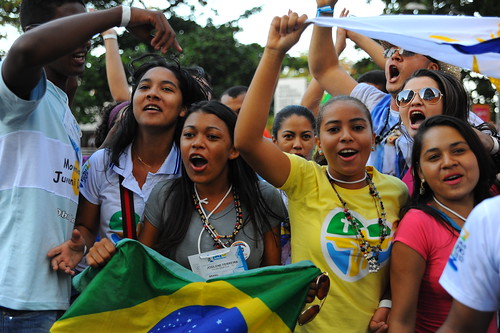22nd July 2013
The Phenomenon of World Youth Day

Denver, Manila, Paris, Buenos Aires, Madrid, Sydney, Czestochowa, Toronto, Cologne, Rome, Santiago de Compostela. What unites all these cities is the experience of hosting World Youth Day (WYD, GMG, JMJ), one of the most spectacular global events in the Christian calendar.
Inaugurated by Pope John Paul II in 1985, this sometimes biennial, sometimes triennial festival of young people has undoubtedly become one of the high points for the Pope and the Roman Catholic Church. As many as two million young people joined Benedict XVI for Mass during searing heat and epic thunderstorms at the last event in August 2011.
Now it’s the turn of Rio de Janeiro. Some would call it serendipity, others Providence, that the first WYD of the first Pope from the Americas had been planned for the continent’s largest Catholic country. Although the number of 4-5 million people who attended WYD in Manila in 1995 is unlikely to be surpassed, without doubt the crowds will be huge.
Despite the economic crisis, a strong contingent from Europe will be present, including over 1,000 – travelling officially or independently – from England, Scotland and Wales. As with any major global event of this sort, the local British consulate has provided travel advice and tips for visitors, and will be on hand to help with any consular emergencies that may arise.
Indeed, major religious pilgrimages are becoming a regular element in the consular work managed by the Foreign and Commonwealth Office – one only has to think of the special team that supports British Haj pilgrims to Mecca every year.
Pope Francis will remember the first WYD to have been held outside Rome, in his native city of Buenos Aires in 1987. As the third Pope to attend a WYD, he will bring his own particular brand of outreach to the young faithful in Rio. As a Jesuit, we can expect the missionary aspect of his ministry to stand out.
What the festival and its media coverage will emphasise, as always, is the global nature of the Roman Catholic Church, and Pope Francis will be conscious of addressing young people from every corner of the world. Brazil celebrates the World Cup in 2014, and the Olympic Games in 2016. But it is unlikely that, to date, Rio has experienced anything like the phenomenon of WYD.
How I wish the whole world is united in truth and live together in love like this so that His glory may be revealed to the world.
Hundreds of young people from Scotland – and beyond! – will be in Stirling this week for Scotland’s Rio, joining in prayer with the Holy Father and young people all over the world. World Youth Day is a fantastic phenomenon for the Church and leaves a joyful footprint on each host city, with incalculable cultural, social, and even financial benefits. God willing one day the UK will take its turn to welcome the Pope once more, this time for a World Youth Day!
Excellent!!! relation for the encounter interfaith global.